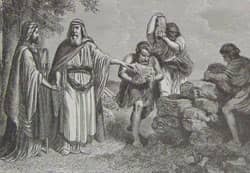Yaakov works hard for seven years to marry Rachel, but his love for her made it feel like it was just a few days. After the time was completed he asked to be wed. At this point, Yaakov was already 84 years old! So they made a feast and the wedding happened . . . only it turns out that Yaakov was fooled into marrying Leah and not Rachel! What is interesting here is that Yaakov and Rachel knew that her father might try to perpetrate something like this. They created hand signs to use that night so he would know it was her but when she saw her sister being prepared for the wedding, she took pity on her and told her the signs. She did not want her sister to be embarrassed by their father’s actions nor did she want her to have to marry Esav.
When confronted, Laban brushed off the concerns by saying that it is their custom to marry off the elder before the younger sibling. However, he was interested in making a deal. He tells Yaakov to enjoy this first week with Leah and then he can marry Rachel too and work another seven years for her. Since Yaakov had promised to marry Rachel, he couldn’t break that vow, not to mention that he loved her. So he did just that. During the next seven years there are a lot of developments.
G-d knew that Leah was the less favored wife and so he enabled her to have children while Rachel was barren. She bore Yaakov four sons -- Reuven, Shimon, Levi, and Judah. When Rachel saw all this, she was jealous. She says to her husband, “Give me children too! I am not dead!” But Yaakov was angry; it wasn’t him who was keeping her from conceiving. So she gave him her maid, Bilhah so she could have some children in the mix. Bilhah bore Dan and Naftali, whom Rachel claimed as her own. Well, Leah wouldn’t have this. She saw that she wasn’t bearing any more children so she gave Yaakov her maid, Zilpah, and she had two sons -- Gad and Asher.
One day, Leah’s son Reuven was in the field and found some dudaim (jasmine), which was rare and a fertility treatment. Rachel wanted some but Leah made her trade her night with Yaakov for it. So Leah slept with Yaakov that night and conceived another son, Issachar, and then another, Zevulun. At this point, she realizes she has borne six children and each maid had borne two. They knew there were to be twelve tribes and here we have ten. When she finds herself pregnant again, she prayed hard for it to be a girl so her sister would have the chance to be at least equal to the maids in sons. She had a daughter named Dinah and our sages say that she actually changed her sex in utero. It was only now that Rachel conceived and bore Yosef (Joseph). Why did she have to wait so long? Well she passed up a night with her husband to try an herbal remedy and Leah conceived on that night. The sages say if she had trusted more in G-d and not tried to fix it, she would have conceived earlier.
 It was at the time Rachel gave birth to Yosef that Yaakov decided it was time to leave Laban’s house. He asked for permission to leave and for a portion in compensation for his work. The next section of the parsha is quite confusing and intentionally so. Laban is trying to cheat Yaakov out of his wages but everything he tries, fails. At one point, he does take a portion and makes it thrive. Any livestock or plants that Yaakov took succeeded and that angered Laban and his sons. Finally, G-d tells him that it is time to head home. Yaakov, being the good husband he was, consulted his wives. He laid the poor treatment by their father at their feet and proposed to them to leave. The women reminded him that he treated them no better and so it was time to leave.
It was at the time Rachel gave birth to Yosef that Yaakov decided it was time to leave Laban’s house. He asked for permission to leave and for a portion in compensation for his work. The next section of the parsha is quite confusing and intentionally so. Laban is trying to cheat Yaakov out of his wages but everything he tries, fails. At one point, he does take a portion and makes it thrive. Any livestock or plants that Yaakov took succeeded and that angered Laban and his sons. Finally, G-d tells him that it is time to head home. Yaakov, being the good husband he was, consulted his wives. He laid the poor treatment by their father at their feet and proposed to them to leave. The women reminded him that he treated them no better and so it was time to leave.
They all packed up while Laban was gone and headed out . . . except, Rachel took her father’s idols. She hid them under her saddle and they left. They had a three-day head start when Laban realized what had happened. He went after them full of anger. He was incensed that they would slip away without his knowledge, however G-d warned him not to speak either good or bad to Yaakov. Laban did accuse them of stealing his gods. Yaakov tells him, “Look we didn’t take them but whomever you find them on shall not live,” not realizing that Rachel had taken them. Laban’s people searched everywhere and when they came to Rachel sitting on her saddle, she didn’t get up. She told him that she had her female monthly visitor and could not get up, which he readily accepted.
At this point, Yaakov is mad. For twenty years he slaved away. He only took what was rightfully his. After having it out, Laban decides to make a pact with Yaakov and move on. In a last fatherly warning he tells Yaakov not to take any wives but these sisters.





